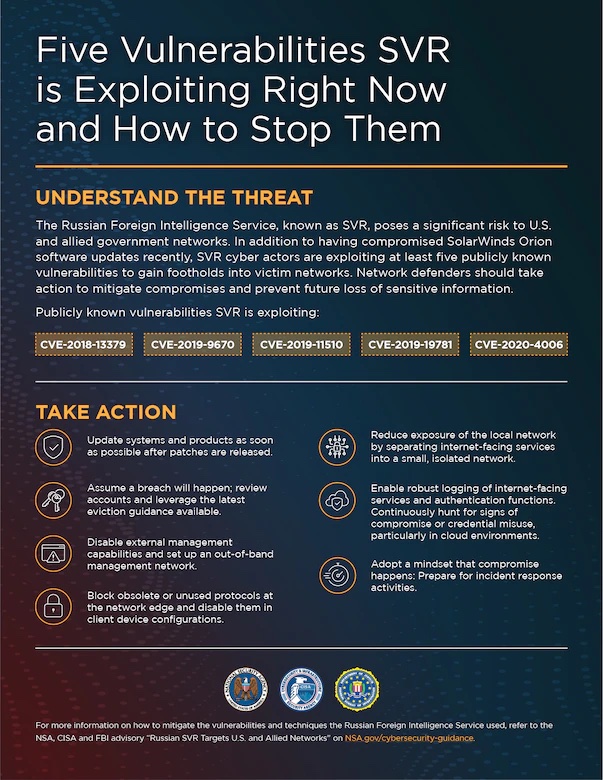US Government Strikes Back At Kremlin For SolarWinds Hack Campaign

US officials on Thursday formally blamed Russia for backing one of the worst espionage hacks in recent US history and imposed sanctions designed to mete out punishments for that and other recent actions.
In a joint advisory, the National Security Agency, FBI, and Cybersecurity and Information Security Agency said that Russia’s Foreign Intelligence Service, abbreviated as the SVR, carried out the supply-chain attack on customers of the network management software from Austin, Texas-based SolarWinds.
The operation infected SolarWinds’ software build and distribution system and used it to push backdoored updates to about 18,000 customers. The hackers then sent follow-up payloads to about 10 US federal agencies and about 100 private organizations. Besides the SolarWinds supply-chain attack, the hackers also used password guessing and other techniques to breach networks.
After the massive operation came to light, Microsoft President Brad Smith called it an “act of recklessness.” In a call with reporters on Thursday, NSA Director of Cybersecurity Rob Joyce echoed the assessment that the operation went beyond established norms for government spying.
“We observed absolutely espionage,” Joyce said. “But what is concerning is from that platform, from the broad scale of availability of the access they achieved, there’s the opportunity to do other things, and that’s something we can’t tolerate and that’s why the US government is imposing costs and pushing back on these activities.”
Thursday’s joint advisory said that the SVR-backed hackers are behind other recent campaigns targeting COVID-19 research facilities, both by infecting them with malware known as both WellMess and WellMail and by exploiting a critical vulnerability in VMware software.
The advisory went on to say that the Russian intelligence service is continuing its campaign, in part by targeting networks that have yet to patch one of the five following critical vulnerabilities. Including the VMware flaw, they are:
- CVE-2018-13379 Fortinet FortiGate VPN
- CVE-2019-9670 Synacor Zimbra Collaboration Suite
- CVE-2019-11510 Pulse Secure Pulse Connect Secure VPN
- CVE-2019-19781 Citrix Application Delivery Controller and Gateway
- CVE-2020-4006 VMware Workspace ONE Access
“Mitigation against these vulnerabilities is critically important as US and allied networks are constantly scanned, targeted, and exploited by Russian state-sponsored cyber actors,” the advisory stated. It went on to say that the “NSA, CISA, and FBI strongly encourage all cybersecurity stakeholders to check their networks for indicators of compromise related to all five vulnerabilities and the techniques detailed in the advisory and to urgently implement associated mitigations.”
A representative of VPN provider Pulse noted that patches for CVE-2019-11510 were released in April 2019. “Customers who followed the instructions in a Pulse Secure security advisory issued at that time have properly protected their systems and mitigated the threat.” FortiNet in recent weeks has also pointed out it patched CVE-2018-13379 in May 2019. The makers of the other affected hardware and software have also issued fixes.

The US Treasury Department, meanwhile, imposed sanctions to retaliate for what it said were “aggressive and harmful activities by the Government of the Russian Federation.” The measures include new prohibitions on Russian sovereign debt and sanctions on six Russia-based firms that the Treasury Department said “supported the Russian Intelligence Services’ efforts to carry out malicious cyber activities against the United States.”
The firms are:
- ERA Technopolis, a research center operated by the Russian Ministry of Defense for transferring the personnel and expertise of the Russian technology sector to the development of technologies used by the country’s military. ERA Technopolis supports Russia’s Main Intelligence Directorate (GRU), a body responsible for offensive cyber and information operations.
- Pasit, a Russia-based information technology company that has conducted research and development supporting malicious cyber operations by the SVR.
- SVA, a Russian state-owned research institute specializing in advanced systems for information security located in that country. SVA has done research and development in support of the SVR’s malicious cyber operations.
- Neobit, a Saint Petersburg, Russia-based IT security firm whose clients include the Russian Ministry of Defense, SVR, and Russia’s Federal Security Service. Neobit conducted research and development in support of the cyber operations conducted by the FSB, GRU, and SVR.
- AST, a Russian IT security firm whose clients include the Russian Ministry of Defense, SVR, and FSB. AST provided technical support to cyber operations conducted by the FSB, GRU, and SVR.
- Positive Technologies, a Russian IT security firm that supports Russian Government clients, including the FSB. Positive Technologies provides computer network security solutions to Russian businesses, foreign governments, and international companies and hosts recruiting events for the FSB and GRU.
“The reason they were called out is because they’re an integral part and participant in the operation that the SVR executes,” Joyce said of the six companies. “Our hope is that by denying the SVR the support of those companies, we’re impacting their ability to project some of this malicious activity around the world and especially into the US.”
Russian government officials have steadfastly denied any involvement in the SolarWinds campaign.
Besides attributing the SolarWinds campaign to the Russian government, Thursday’s release from the Treasury Department also said that the SVR was behind the August 2020 poisoning of Russian opposition leader Aleksey Navalny with a chemical weapon, the targeting of Russian journalists and others who openly criticize the Kremlin, and the theft of “red team tools,” which use exploits and other attack tools to mimic cyber attacks.
The “red team tools” reference was likely related to the offensive tools taken from FireEye, the security firm that first identified the Solar Winds campaign after discovering its network had been breached.
The Treasury department went on to say that the Russian government “cultivates and co-opts criminal hackers” to target US organizations. One group, known as Evil Corp., was sanctioned in 2019. That same year, federal prosecutors indicted the Evil Corp kingpin Maksim V. Yakubets and posted a $5 million bounty for information that leads to his arrest or conviction.
Although overshadowed by the sanctions and the formal attribution to Russia, the most important takeaway from Thursday’s announcements is that the SVR campaign remains ongoing and is currently leveraging the exploits mentioned above. Researchers said on Thursday that they’re seeing Internet scanning that is intended to identify servers that have yet to patch the Fortinet vulnerability, which the company fixed in 2019. Scanning for the other vulnerabilities is also likely ongoing.
Mass scanning activity detected from 168.63.249.142 (??) targeting Fortinet VPN servers vulnerable to unauthenticated arbitrary file read (CVE-2018-13379) leading to disclosure of usernames and passwords in plaintext. #threatintel pic.twitter.com/heH9jxhmyS
— Bad Packets (@bad_packets) April 15, 2021
People managing networks, particularly any that have yet to patch one of the five vulnerabilities, should read the latest CISA alert, which provides extensive technical details about the ongoing hacking campaign and ways to detect and mitigate compromises.
READ MORE HERE

